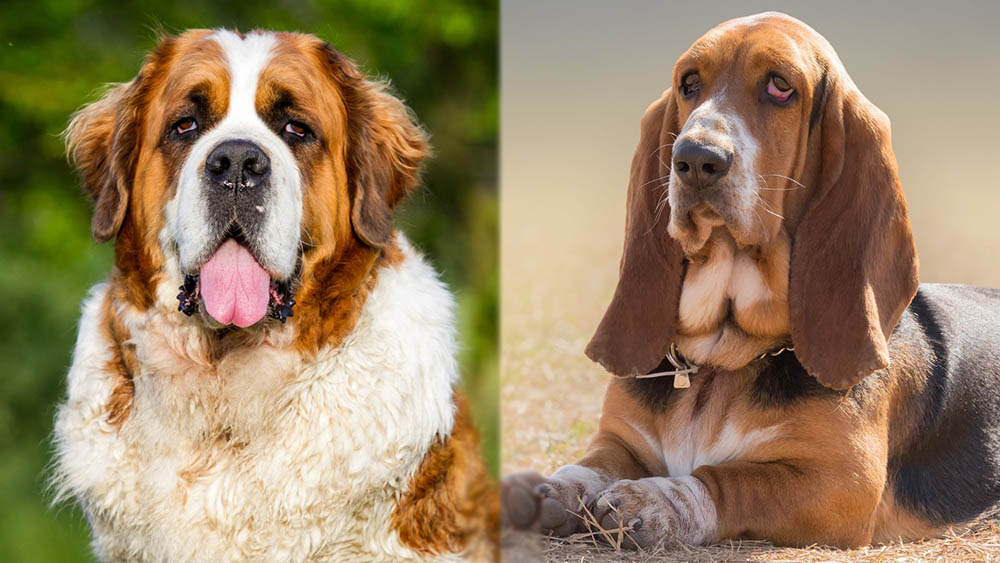St. Bernard Basset Hound Mix: Pictures, Care, Temperament & Traits
By Jordyn Alger
Updated on

The St. Bernard and the Basset Hound are two breeds that have been beloved for generations. Their charming personalities make them excellent companions, so it is only natural that some dog owners may wonder about a combination of the two.
The St. Bernard Basset Hound mix results from crossing the St. Bernard and the Basset Hound, and its personality is just as sweet as its parents’. If you are interested in learning more about such a special hybrid breed, keep reading below.
| Height: | 20–30 inches |
| Weight: | 70–120 pounds |
| Lifespan: | 9–12 years |
| Colors: | Brown & white, black & white, mahogany & white, orange & white, lemon & white, white & red, black & brown, tan & white |
| Suitable for: | Families with children, multi-pet households, moderately active families |
| Temperament: | Patient, easygoing, playful & charming, inquisitive |
The St. Bernard is a large, strong dog categorized in the working group, and the Basset Hound was bred as a hunting companion. As a result, the combination of the St. Bernard and the Basset Hound has the potential to create a powerful dog with a high prey drive. Still, this breed is known for being mild-mannered, friendly, and steadfastly loyal.
St. Bernard Basset Hound Mix Characteristics
St. Bernard Basset Hound Mix Breed Puppies
The St. Bernard Basset Hound mix will not be easy to find. It is unlikely that you will be able to locate one at your local animal shelter; however, you are certainly encouraged to try.
You will most likely find your St. Bernard Basset Hound mix puppy from a breeder. While searching for breeders, be sure to verify that your chosen breeder is ethical and reputable. In some instances, St. Bernard Basset Hound mix puppies may cost more than adult dogs.
Other costs that you will need to anticipate include upfront expenses such as food, feeding bowls, drinking bowls, and more. For training, you will need to purchase collars, leashes, and treats. You also need to set aside money for obedience classes.

Temperament & Intelligence of the St. Bernard Basset Hound Mix
Both the St. Bernard and the Basset Hound have excellent dispositions. St. Bernards are known to be incredibly affectionate, while the Basset Hound can be somewhat more reserved; still, both breeds have a lot of love to give their families. The St. Bernard Basset Hound mix can be somewhat independent and may, at times, ignore commands in favor of doing its own thing. While this dog needs routine tasks for mental stimulation, it does not tend to bounce off of the walls without constant entertainment. In fact, you may notice your St. Bernard Basset Hound mix prefers to snuggle on the couch beside you rather than run around in the yard.
Are These Dogs Good for Families? 👪
The St. Bernard is known as a gentle giant. Although large and imposing, this massive dog is patient, charming, and excellent with children. Some refer to the St. Bernard as a nanny dog since it is so even-tempered and sweet with children. As for the Basset Hound, while slightly more reserved than the St. Bernard, this pup is just as good with children. So, the St. Bernard Basset Hound mix is a perfect candidate for a family dog.
Does This Breed Get Along with Other Pets?
The St. Bernard Basset Hound mix gets along well with other pets. The St. Bernard is moderately good with other pets, but its large size may sometimes cause it to bump into smaller animals and accidentally hurt them. The Basset Hound is incredible with other pets and is small enough that animals such as cats don’t have much danger of getting stepped on.
The St. Bernard Basset Hound mix’s tolerance towards other animals may vary depending on which parent it takes after more, but in general, they should get along just fine with other pets. Still, be sure to properly introduce your St. Bernard Basset Hound mix to new animals and have all pets adequately socialized to avoid aggressive or fear-based behaviors.
Things to Know When Owning a St. Bernard Basset Hound Mix:
Food & Diet Requirements 🦴
To provide a proper and healthy diet for the St. Bernard Basset Hound mix, feed your dog high-quality canine food, whether commercial kibble or wet food. All foods you feed to your St. Bernard Basset Hound mix should have a healthy source of protein and should be age-appropriate, with different meals for puppies, adults, and seniors.
Exercise 🐕
Neither the St. Bernard nor the Basset Hound is a particularly active dog. Still, the St. Bernard Basset Hound mix will require routine, moderate activity to maintain a healthy weight and prevent muscle loss. Long walks are the perfect amount of exercise for this mixed breed.
Training 🎾
Which parent your St. Bernard Basset Hound mix takes after most may determine how easy it is to train this pup. The St. Bernard is eager to please, whereas the Basset Hound can be independent and aloof. Training and socializing this mixed breed are absolutely necessary, especially if it takes after the St. Bernard in size. Early socialization and obedience training will help establish a firm foundation so that you can teach your dog not to jump on people or use their size to their advantage.
Grooming ✂️
Once again, your dog’s grooming care will depend heavily on whether they take after the St. Bernard or the Basset Hound. Either way, regular brushing will be necessary to care for your dog’s coat to keep the skin healthy and the fur shiny and clean.
If your St. Bernard Basset Hound mix takes after the Basset Hound, you must do extra maintenance to keep your dog smelling fresh. The folds of the Basset Hound’s skin can trap grease and debris, creating a foul smell over time if not cleaned away. Taking a wipe to your St. Bernard Basset Hound mix’s body each day will help to prevent this foul smell from taking root in the first place.
If your dog has long hair like many St. Bernards, more frequent brushing will be necessary to ensure that painful tangles and mats do not form.
Health and Conditions 🏥
As a mix between the St. Bernard and the Basset Hound, your St. Bernard Basset Hound mix may be prone to both of its parents’ high-risk health issues.
Serious Conditions:
An incredibly grave condition that your St. Bernard Basset Hound mix may be at higher risk o bloat. Bloat occurs when gas expands your dog’s stomach, leading to abdominal pain. In severe instances, the stomach enlarges to the point of restricting blood flow to other parts of the body. This can lead to shock and, in some cases, death. If you suspect that your dog is experiencing bloat, contact your vet immediately.
Signs of bloat include:
- Pale gums
- Expanded abdomen
- Protectiveness of stomach
- Anxious behavior (pacing, whining, etc.)
- Panting
- Drooling
- Rapid heartbeat
- Dry heaving
- Emitting white foam from the mouth
- Collapsing
In some instances, bloat can progress to a more serious condition known as Gastric Dilatation-Volvulus Syndrome, or GDV. This occurs when the stomach twists in a way that prevents the contents of the stomach from being passed as fecal matter or vomit.
The signs of GDV are similar to those of bloat, even though GDV can occur without bloat. If you suspect your dog is experiencing either of these conditions, seek emergency treatment immediately. Both bloat and GDV can become rapidly fatal.
If your St. Bernard Basset Hound mix has long fur, as many St. Bernards do, it will be more vulnerable to heatstroke. Heatstroke is a severe heat-related illness that can lead to organ damage, organ failure, and even death.
Signs of heatstroke include:
- Panting
- Redness of the gums
- Rapid heart rate
- Dehydration
- Vomiting and diarrhea
- Disorientation and confusion
- Staggering
- Collapse
- Seizures
Minor Conditions:
If your St. Bernard Basset Hound mix inherits the Basset Hound’s floppy ears, it will be prone to developing ear infections. You must check your dog’s ears regularly to ensure no infections are taking root.
Signs of ear infections include:
- Redness of the ear
- Odor emitting from the ear
- Frequent head shaking, itching, or scratching
- Constantly tilting the head
- Discharge
Another condition to keep an eye out for is hip dysplasia, which both the St. Bernard and the Basset Hound are prone to developing. This developmental condition often occurs as puppies are still growing, where the joint is formed incorrectly. This leads to dysfunction and pain.
Signs that your dog may have hip dysplasia include:
- Limping or “bunny hopping”
- Sounds emanating from the joints during movement
- Strange sitting or walking positions
- Difficulty climbing or dismounting objects
- Occasional or frequent lameness
Male vs Female
The main difference between male and female St. Bernard Basset Hound mixes is the sizes, as males tend to be larger on average. However, you may also notice more pronounced behavioral differences between the sexes if they are not spayed or neutered. For instance, intact male dogs are likelier to mark furniture and objects with urine. Castration is shown to be effective in reducing urine marking by 90%.
3 Little-Known Facts About the St. Bernard Basset Hound Mix
1. The St. Bernard Breed Was in Jeopardy
The entire St. Bernard breed faced the threat of extinction, but in the early 20th century, fanciers in the United States dedicated themselves to supporting and returning the breed to its former state.
2. Basset Hounds Have a Remarkable Sense of Smell
The Basset Hound’s long ears aren’t just for show; they are also incredibly useful for stirring up scents on the ground and directing them straight into the Basset Hound’s nose. The Basset Hound was bred to aid in hunting, so its scent-tracking skills are impressive, to say the least. Some say the Bloodhound is the only dog that can beat the Basset Hound’s remarkable scent-tracing skills.
3. The Basset Hound Isn’t Much of a Guard Dog, but the St. Bernard Is
How good of a guard dog your St. Bernard Basset Hound mix is will depend on which parent it resembles. St. Bernards are vigilant watchdogs, but while Basset Hounds will bark to alert you of strangers, they won’t do much besides that.
Final Thoughts
The St. Bernard Basset Hound mix is a docile, friendly dog with a lot of love to give. While certain personality traits may differ depending on which parent’s characteristics come through more strongly, for the most part, the St. Bernard Basset Hound mix is a patient and charming dog that fits into any family dynamic with ease.
This dog does well in moderately active families and will tolerate the presence of other pets and children. Due to the size that the St. Bernard Basset Hound mix may reach, training and socialization are essential, so any owner of this hybrid breed will need to be confident in their dog training skills.
If you think the St. Bernard Basset Hound mix is the right fit for you, check your local animal shelter before researching reputable breeders in your area. No matter where you get your St. Bernard Basset Hound mix from, this dog will surely be a beloved companion.
Featured Image Credit By: (L) Aneta Jungerova, Shutterstock | (R) Bill Anastasiou, Shutterstock













